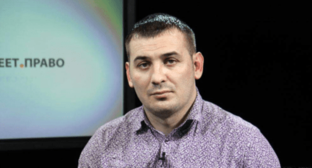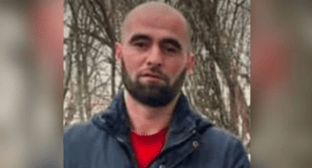07 April 2010, 00:00
Week in the Caucasus: review of main events of March 29-April 4
Terror acts of suicide-bombers in Moscow and Northern Caucasus cause tough reaction of the Kremlin and give rise to fears of Caucasian phobia outbreak; Mayor of capital of Kalmykia convicted conditionally, another person takes his place; court session on attack on Nalchik disrupted; Georgia releases several detainees, and South Ossetia agrees to Geneva discussions, - look up these and other events in the review of the week of March 29-April 4, 2010, in Caucasian regions prepared by the "Caucasian Knot".
Suicide-bombers blow themselves up in Moscow and in the Caucasus
On Monday, March 29, two powerful explosions were triggered at two stations of Moscow metro - Lubyanka and Park Kultury, committed by two women-suicide-bombers, as the investigation asserts. As a result of these terror acts 40 persons were lost, and 95 more persons received wounds of various gravity.
According to inspectors, one of the terrorists was Jannet Abdurakhmanova (Abdulaeva), born in 1992 of the birth, who lived in the Khasavyurt District of Dagestan.
However, Rasul Magomedov, a resident of Balakhani village of the Untsukul District of Dagestan, asserts that the suicide-bomber was not Abdurakhmanova, but his daughter - Maryam Sharipova. According to his story, he recognized Maryam, 28, who disappeared several days before the terror act, by a photo published in the Internet after the explosion.
The second suicide-bomber has not been identified yet. A version was moved about involvement in the terror acts of Markha Ustarkhanova, the widow of Said-Emin Khizriev, leader of Gudermes militants, who was killed last October; however, the version failed, as reported by a source in law enforcement bodies of Chechnya. Zukhra Tsipinova, a former wife of Anzor Astemirov, leader of the Kabardino-Balkarian and Karachai underground, who was liquidated on March 24 in Nalchik. This version was doubted by the people who know the girl.
Umarov takes responsibility, experts doubt
Dokku Umarov, leader of North-Caucasian militants, has stated in his video address promulgated by the resource YouTube that the terror acts in Moscow metro are the response to the special operation of power agents in Ingushetia, where along with members of the armed underground on February 11 four peaceful residents of Chechnya were lost. He promised that more explosions would follow.
The video record of Umarov's address appeared in the Internet some time after another statement, made by some unknown person on behalf of Dokku Umarov. An off-screen voice stated Umarov's non-involvement in Moscow metro explosions and refused from any responsibility for these terror acts. According to journalist Andrei Babitsky, who had contacted Dokku Umarov for many times, the off-screen voice was not Umarov's voice.
Experts are not unanimous as to the reliability of the information announced in his second appeal and say that it should be checked.
The explosions in Moscow have raised a wave of fears as to strengthening of anti-Caucasian moods. The fears are not groundless - soon after the metro explosions two women who wore hijabs and two men - natives of the Caucasus - were beaten in the metro, as eyewitnesses report. Residents of Chechnya have expressed their fears in the context of scale-up of Caucasus-phobia in Russia and persecution of natives from the Caucasus in Moscow and other large Russian cities.
In his turn, Dukuvakha Abdurakhmanov, speaker of the parliament of Chechnya, has accused Moscow special agencies of negligence and complicity to terrorists. "While high-ranking persons today name the North-Caucasian region to be the 'culprit' in their reports to their bosses, we should state that we believe the Moscow special agencies, law enforcement bodies or security forces of Moscow to be really guilty," he said.
Explosions continued in Dagestan
While the society was coming into senses after the terror acts in Moscow, on March 31, on Wednesday, two powerful explosions were triggered in the Dagestan city of Kizlyar. The first one was committed along the route of a militia patrol unit, and the second explosion, triggered 20 minutes later, was directed against the militiamen and physicians who arrived to the place of the first accident. The twin explosions were committed near School No. 1. The power of the first Kizlyar explosion was up to 20 kilos of trotyl equivalent. Windows were broken in the nearby houses, some buildings were partially destroyed. 12 persons were lost and over 20 more were wounded.
Both explosions were committed by suicide-bombers. One of them was at the steering wheel of a parked car, and the second one, dressed in militia uniform, blew himself up close to a group of doctors and militiamen who arrived to the place of the first explosion.
President of the Russian Federation Dmitri Medvedev and Prime Minister Vladimir Putin do not exclude that the twin terror act in Dagestan was organized by the same persons, who organized the explosions in Moscow metro.
On the following night, on April 1, two more explosions were triggered in Dagestan - in the Khasavyurt District. Two persons were lost, as reported by the press service of the Ministry of Internal Affairs (MIA) of the republic.
President orders to strengthen security in Russia
On that very say at about 1:10 p.m., a helicopter with Russian President Dmitri Medvedev onboard landed on the central square of the capital of Dagestan. He held a meeting in Makhachkala with region heads of the North-Caucasian Federal District (NCFD), bosses of the territorial divisions of Federal Security Bureau (FSB) and law-enforcement bodies. The President stated the need to reform the whole system of law enforcement bodies and fixed five main targets, to be achieved by the country's leadership.
One the previous day, Mr Medvedev ordered the government to develop, within four months, a system of transport security.
Despite the taken measures, on April 4, at 3:50 a.m. Moscow time, in the 2353rd km of the Makhachkala section of the North-Caucasian Railways an explosive was triggered under a cargo train. As a result of the explosion, eight cars and the train locomotive were derailed; fortunately, there were no casualties and victims. A crater with a diameter of 1.1 meter and 25 centimetres deep was formed by the explosion.
Ex-mayor of Elista, capital of Kalmykia, sentenced conditionally
The Elista City Court has sentenced Radii Burulov, former mayor of this city, to four years of conditional imprisonment and a three-year ban to take posts in any state and municipal bodies. He was found guilty under the articles of "illegal participation in entrepreneurial activities" and "abuse of official position".
He was accused of illegally ensuring victory in the tender on shipment of POLs (petroleum, oil, lubricants) of the company, belonging to his family members. The sum of estimated damage caused by his actions makes 698,000 roubles.
On that very day, at the sixth extraordinary session of the Elista City Assembly, its speaker Vyacheslav Namruev was elected to be a new Mayor of the capital of Kalmykia.
Semyon Ateev, President of the Kalmyk Human Rights Centre, believes that Burulov's dismissal was caused by personal conflicts with President of Kalmykia Kirsan Ilyumzhinov.
Kabardino-Balkaria: trial on Nalchik attack disrupted
On March 29, in Kabardino-Balkaria, the defendants on the criminal case dealing with the militants' attack on Nalchik undertaken on October 13, 2005, again disrupted the litigation process by objecting to replacement of an advocate.
Advocate Ahmetova could not appear at the session because of death of her close relative. She had warned the court and asked her colleague Shorova to take the defence of her clients Murat Midov and Arthur Kuchmenov. However, when asked by the chairing judge about their consent to replacement, both defendants answered in the negative. The continuation of the process was reappointed on Tuesday, March 30.
On the eve of Geneva debates Georgia releases two Russians and a South-Ossetian
On Tuesday, March 30, on the border of South Ossetia with Georgia in the settlement named Ergneti, the Georgian party delivered three prisoners to the frontier service of the KGB of South Ossetia.
In the course of a meeting with journalists, one of the detainees - Zaurbek Khestanov - said that Georgian authorities had demanded from him to give up Russian citizenship and promised an apartment in Georgia and a place of a student at a prestigious university instead.
Another detainee - Amzoev - said that he could not get to homeland, because Georgians refused to return him his documents and his "Niva" car, with which he was detained in August 2009, when he was bringing his grandson for study in Georgia.
David Sanakoev, Ombudsman in South Ossetia, said that by the end of February the number of Georgian citizens detained at attempts to cross the border of South Ossetia was 12 persons. The border infringers had no IDs or other documents on them. In similar situations authorities of Georgia place citizens of the Republic of South Ossetia (RSO) into prisons, said Mr Sanakoev.
He has noted that at present the negotiating process about exchanging "all for all" is in the deadlock.
On March 30, the tenth round of the Geneva discussions took place. The meeting discussed the issue of disappeared citizens of South Ossetia and a draft agreement on non-use of force, presented by Russia. The new draft was accepted by all the parties, who agreed that the document could form the basis for future guarantees of non-use of force against South Ossetia and Abkhazia. This was reported by Boris Chochiev, Plenipotentiary of the President of the RSO for post-conflict settlement. However, the Georgian party stated that it is ready to sign a non-use of force agreement with Russia, but not with Abkhazia and South Ossetia.
Pamfilova discusses human rights situation with civil society of Ingushetia
On April 1, Ella Pamfilova, head of the Board at the President of the Russian Federation on promotion of development of institutes of civil society and human rights, visited Ingushetia with the aim to study the situation in situ and meet and talk with public activists of the republic.
At the meeting, Magomed Aushev, head of the public organization "Bokyo" (Law) said that the criminal case on the fact of murdering his son - well-known Ingush public figure Maksharip Aushev - lasts for more than four months already, but still there are no practical results.
Another participant of the meeting - Musa Zurabov, Chairman of the Coordination Board of Ingush NGOs, told about social and economic problems in the republic, and about mass violations of the rights of Ingush nationals in the Republic of North Ossetia-Alania.
Magomed Mutsolgov, head of the human rights organization named "Mashr", spoke about the problem of violation of human rights by law enforcement bodies. Besides, he mentioned the topic of return of Ingushes to North Ossetia, nationality-inspired persecutions of Ingushes and Chechens in prisons and in the course of regular military service, and focused attention on the problem of kidnapped persons.




